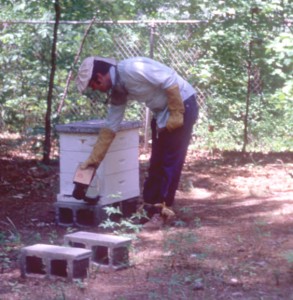The 2021 spring season is barely hours old and the surviving bees that I have are already robbing dead outs. I mean foragers are barely finding pollen, but these robbing foragers already knew to go looking for dead neighbors. I continue to be amazed at the practicality of this behavior.
Using robbing behavior to determine the vitality of the nectar flow
Just a comment. I have no proof, only observations. I suspect that increased robbing behavior is directly related to the productivity of the nectar flow. This has always been been beekeeping common sense. Extracting after the flow was over always brought hoards of curious bees to the extracting area.
But my comment is that robbing behavior in the bee yard (it appears) can be used as a barometer of the nectar flow. If weather temporarily stops the flow, I suspect that foragers will be attracted to the equipment that has their interest – even if the honey rewards are scant. I suspect if the flow starts up again, the robbing foragers will be gone. It is as though frames or combs still having small amounts of honey can give the beekeeper an idea of the condition of the flow that day in that yard. I’m only guessing.
If I photograph, the pic only looks like robbing behavior.
jtew
Just a thought about colony guard bees….
This summer, I had an issue with one or two aggressive colonies. I had to move them from my home apiary. When I opened the stockade gate to my apiary — guard bees were immediately there for me. After moving the offending colonies, things really calmed. But even now after having worked bees and reentering the apiary, several bees are (nearly) immediately upon me.
I had the thought that these bees are not guarding a particular colony – they are essentially guarding the apiary – which in turn guards the their home colony. Could I call these defensive bees – “apiary guard bees”? Do they remember my various odors or my appearance? They seem to be more that spontaneous colony guards. Its impossible to determine from which colony these apiary guards are from. I find this global guarding behavior interesting.
Being Gentle with the Bees
Being a bee-friendly beekeeper
Within a wide range, each beekeeper maintains their colonies in ways suitable to their lifestyle and personal schedule. Some of us can allocate more time to our bees than others. As colony numbers increase, you should expect to spend less time with individual colonies. Beekeepers who rarely manipulate their colonies will most likely have
some, or even many, die. Alternatively, beekeepers who open their practically every day are also putting stress on their colonies. New beekeepers can be somewhat excused. They are still learning and are excited to explore their new bee world.
Beekeepers,
Though I have had a blog for several years, my efforts here are a small rekindling of my interest in this format. I will be posting more PowerPoint PDF files and short Video files on this medium and will be using this site more for general bee-related discussions. Look in the pull down menu for my preliminary efforts.
If I can maintain my focus and direction, I hope to use this medium to communicate with beekeepers in a more efficient manner while I grow more competent in the electronic bee community.

The pictured beekeeper is James E. Tew, 43 years ago, working his first hive at the Auburn University apiary. As a brand new beekeeper, I wore canvas gloves, an Alexander Veil, and taped my pant cuffs. I was crazy for bees. I still am.